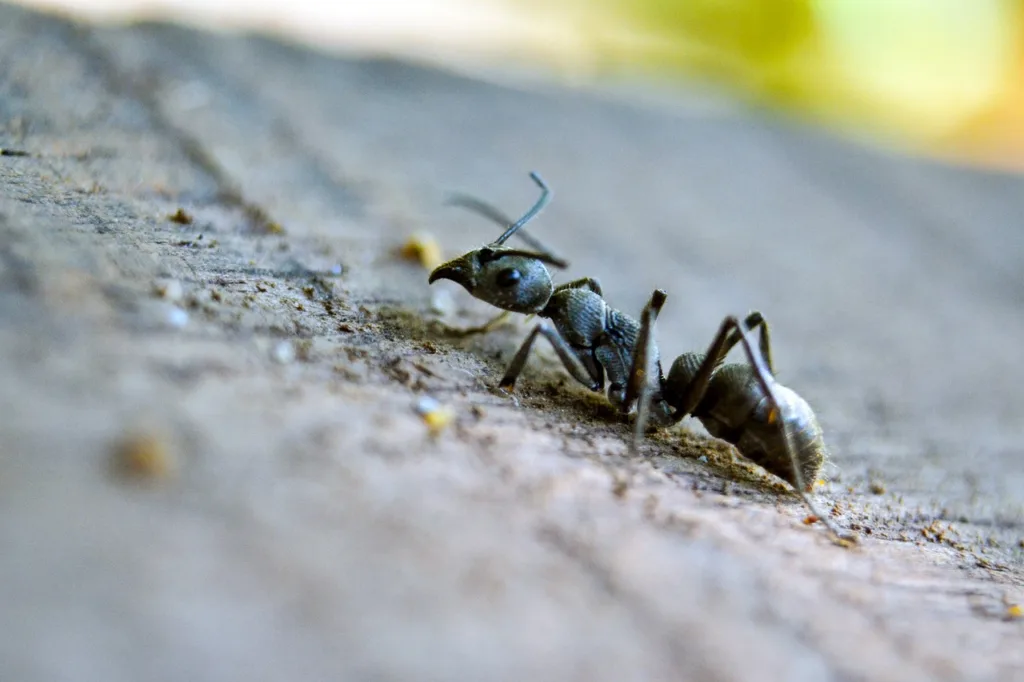Introduction
Winter might seem like a time when bugs disappear, but guess what? Ants are sneaky little creatures! I learned this the hard way when I discovered a tiny ant army marching through my kitchen during a freezing January weekend. These persistent insects don’t take a break just because it’s cold outside. They’re actually looking for warm shelter and food, which makes our cozy homes their perfect winter destination.
My journey of battling ants in home in winter taught me some incredible secrets that I’m super excited to share. If you’re tired of these tiny invaders ruining your peaceful winter days, you’re in the right place. Get ready for some game-changing strategies.
Understanding Why Ants Invade Homes in Winter

Winter isn’t just tough for humans – it’s brutal for ants too! These tiny creatures aren’t built to survive extreme cold. When temperatures drop, ants go into survival mode. My research and personal experiences reveal fascinating reasons behind their home invasions.
Food scarcity drives ants crazy. Outside, natural food sources become limited during winter. Your warm kitchen becomes their ultimate buffet! Crumbs, unsealed food containers, and even tiny sugar residues become irresistible attractions for these hungry travelers.
Warmth is another critical factor. Your heated home feels like a tropical paradise to them. They’re essentially looking for a cozy winter retreat, just like humans seek comfortable spaces.
Nest protection becomes paramount. When outdoor conditions become harsh, ant colonies seek stable environments. Your home provides perfect temperature, protection from wind, and potential food sources. It’s like a five-star hotel for these tiny creatures!
Different ant species have unique winter survival strategies. Some build complex underground chambers, while others seek indoor shelter. Carpenter ants, for instance, can actually create nests inside wooden structures, making them particularly tricky winter invaders.
Moisture also plays a significant role. Leaky pipes, condensation, and damp areas attract ants. They need water to survive, and your home might unknowingly provide perfect moisture conditions.
Understanding these motivations is the first step in preventing ants in home in winter. Knowledge is power in this tiny battle.
Table of Contents
Identifying Common Ant Entry Points in Your Home
Ants are basically tiny ninjas when it comes to entering homes during ants in home in winter! They can squeeze through impossibly small spaces that you’d never imagine.
Cracks in foundation are like welcome mats for ants. These tiny openings might look harmless, but they’re major highways for ant invasions. I once discovered a massive ant trail coming through a hairline crack near my basement window during ants in home in winter.
Windows and doors are prime entry zones. Weatherstripping that’s worn out or damaged creates perfect ant highways. Check these areas carefully – even a millimeter-wide gap can become an ant superhighway!
Utility lines offer another secret passage. Pipes, electrical cables, and other utility connections often have small gaps around them. These spaces are like VIP entrances for ant colonies.
Kitchen and bathroom areas are high-risk zones. Plumbing connections, especially under sinks, create moisture and potential entry points. Ants love these damp, warm environments.
Wooden structures with moisture damage become ant magnets. Rotting wood, especially around window frames or foundations, provides both entry and potential nesting spaces.
Outdoor vegetation touching your home creates natural bridges. Tree branches, bushes, and plants close to walls can help ants navigate directly into your living space.
Natural Remedies to Keep Ants Away in Winter
Mother Nature provides some awesome ant-fighting weapons! I’ve discovered several incredible natural solutions that work like magic against ants in home in winter.

Vinegar is a superhero in ant prevention when dealing with ants in home in winter. Fill the spray bottle with half water and half white vinegar, and mix them well. This solution disrupts ant scent trails and creates a natural barrier. I spray this around potential entry points and watch the magic happen!
Cinnamon isn’t just for baking – it’s an ant repellent that works wonders during ants in home in winter! Sprinkle ground cinnamon near entry points. Ants absolutely hate this spice. It’s like a natural force field that keeps them away. Pro tip: Use Ceylon cinnamon for best results.
Okay, here is the easy way to get rid of ant infestation! Peppermint essential oil works very well. Take a spray bottle. Fill it with water and add 10-15 drops of Peppermint essential oil. Shake well and mix. If you spray this all over the house, not only will the mint smell be pleasant, but the ants will also run away because they can’t stand the strong smell. I use this in my kitchen and around baseboards.
Lemon juice creates another fantastic barrier for preventing ants in home in winter. The acidic properties mess with ant communication and navigation. I squeeze fresh lemon juice near potential entry zones.
Cucumber peels might sound weird, but they’re surprisingly effective. Ants despise the smell and will avoid areas with fresh cucumber peels. It’s like a natural ant force field!
Coffee grounds serve double duty. They repel ants and can be composted later. Sprinkle used coffee grounds around your home’s perimeter.
Simple Cleaning Tips to Prevent Ant Infestations
Cleanliness is your most powerful weapon against ants in home in winter! These tiny invaders are attracted to mess and food residue.
1. Kitchen counters need military-grade cleaning. Wipe down surfaces immediately after cooking. Those tiny crumbs are like gourmet meals for ants. I use a mixture of warm water and dish soap for thorough cleaning.
2. Sealed food containers are non-negotiable. Invest in good quality, airtight containers. Store everything from sugar to pet food securely. Ants have superhuman ability to detect even the smallest food sources.
3. Trash management is crucial. Empty kitchen trash daily and use bins with tight-fitting lids. Food waste is like a five-star restaurant advertisement for ants.
4. Floors require special attention. Vacuum and mop regularly, especially in eating areas. Pay extra attention to corners and hard-to-reach spaces where crumbs love to hide.
5. Dirty dishes are ant magnets. Never leave dirty dishes overnight. Rinse them immediately or put them in the dishwasher. Those tiny food particles are irresistible to ants.
6. Pet food areas need consistent cleaning. Use elevated food stations and clean up immediately after pet meals. Ants love pet food just as much as your furry friends do!
7. Refrigerator and pantry organization matters. Regularly check for spills, expired items, and potential ant entry points. A clean, organized food storage area is your best defense.
Effective DIY Solutions to Eliminate Ants Quickly
When ants declare war, you need quick, powerful solutions! I’ve battled these tiny invaders and discovered some killer DIY strategies.
- Borax and sugar mixture works like magic. Mix equal parts borax and powdered sugar. Create small bait stations near ant trails. The sugar attracts ants, while borax eliminates the entire colony. Caution: Keep away from pets and children!
- Chalk lines might sound ridiculous, but they’re surprisingly effective. Ants can’t cross chalk lines! Draw barriers around entry points. It’s like creating an invisible force field.
- Boiling water is a brutal but effective method. Pour directly into ant hills near your home’s foundation. This instantly eliminates visible ant populations. Warning: Be careful and wear protective gear!
- Cornstarch can trap and suffocate ants. Sprinkle around entry points. When ants walk through it, they get completely covered, disrupting their movement.
- Soap water solution creates instant ant elimination. Mix dish soap with water in a spray bottle. Spray directly on ants to break down their protective outer layer. It’s like kryptonite for these tiny invaders!
- Baking soda and powdered sugar create another powerful bait. Similar to borax method, but potentially safer around pets. The mixture destroys ant digestive systems.
- Hydrogen peroxide mixed with water creates an effective ant killer spray. It disrupts their breathing and navigation systems. Spray directly on ant trails and entry points.
How to Protect Your Home from Ants Year-Round
Ant prevention is a year-round battle! Seasonal strategies can help keep these tiny invaders at bay.

- Regular home inspections are critical. Check your home’s foundation, windows, and potential entry points every few months. Early detection prevents massive infestations.
- Landscaping plays a crucial role. Keep plants trimmed away from your home’s exterior. Create a clear boundary that makes ant invasion difficult. Think of it like creating a defensive perimeter.
- Seasonal sealing becomes your best friend. Use caulk to seal potential entry points during different seasons. Pay special attention to areas around windows, doors, and utility lines.
- Professional pest control consultation can provide customized strategies. They understand local ant species and their unique behaviors. Sometimes, expert advice prevents future invasions.
- Natural barrier maintenance is ongoing. Regularly reapply natural repellents like cinnamon, peppermint, and vinegar solutions. Consistency is key in ant prevention.
- Indoor cleanliness remains a constant battle. Develop habits that minimize food residue and potential ant attractions. Clean as you go, and don’t give ants any reason to visit.
- Electronic pest repellents offer modern solutions. Ultrasonic devices can help deter ants and other insects. Research and choose reputable brands.
Conclusion
Battling ants in home in winter isn’t impossible – it’s a strategic war you can win! Everything we’ve discussed provides a comprehensive plan to protect your living space. No single method works perfectly, but combining multiple approaches creates a powerful ant-prevention system. Your home is your sanctuary, and with these techniques, you’ll keep those tiny invaders at bay. Stay proactive, stay informed, and enjoy a pest-free winter!
FAQs
Why do ants come inside during winter?
Ants seek warmth, food, and shelter from cold temperatures.
Are chemical ant killers safe?
Some can be harmful. Always read labels and keep away from children and pets.
How quickly can natural remedies work?
Effectiveness varies, but some methods show results within 24-48 hours.
Can ants damage my home?
Some species like carpenter ants can cause structural damage if left unchecked.

